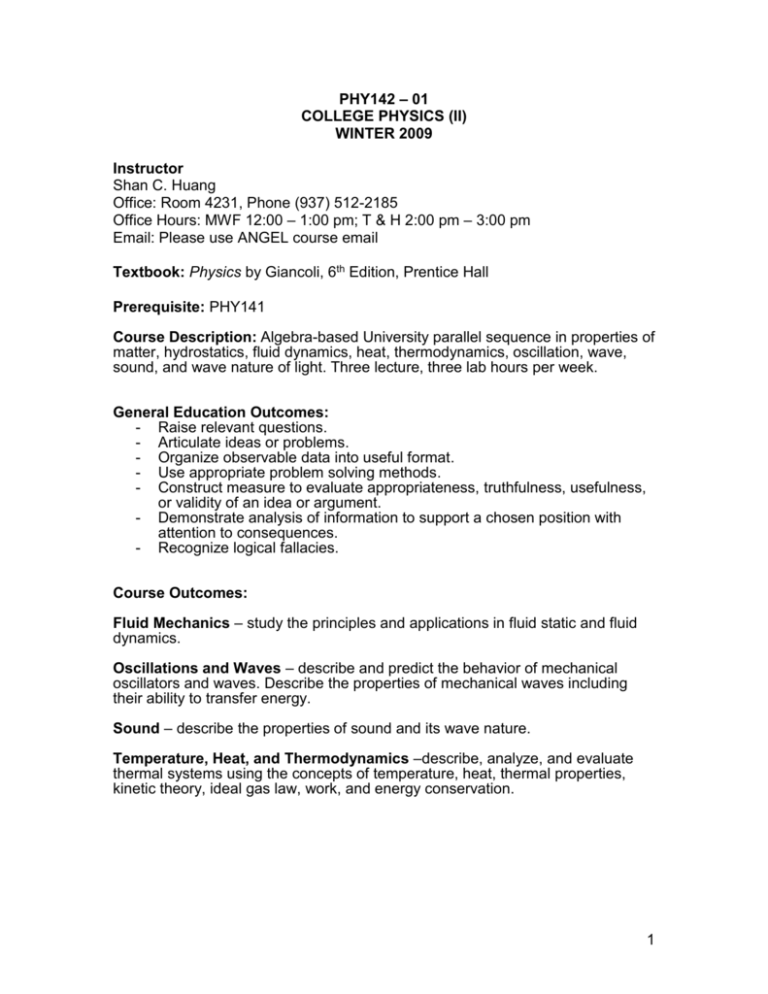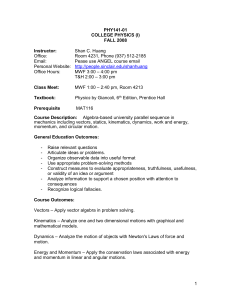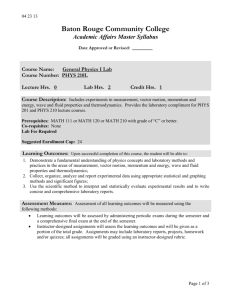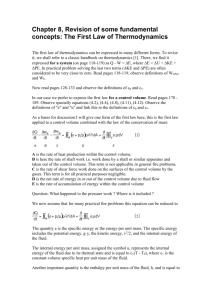PHY142 – 02 - Sinclair Community College
advertisement

PHY142 – 01 COLLEGE PHYSICS (II) WINTER 2009 Instructor Shan C. Huang Office: Room 4231, Phone (937) 512-2185 Office Hours: MWF 12:00 – 1:00 pm; T & H 2:00 pm – 3:00 pm Email: Please use ANGEL course email Textbook: Physics by Giancoli, 6th Edition, Prentice Hall Prerequisite: PHY141 Course Description: Algebra-based University parallel sequence in properties of matter, hydrostatics, fluid dynamics, heat, thermodynamics, oscillation, wave, sound, and wave nature of light. Three lecture, three lab hours per week. General Education Outcomes: - Raise relevant questions. - Articulate ideas or problems. - Organize observable data into useful format. - Use appropriate problem solving methods. - Construct measure to evaluate appropriateness, truthfulness, usefulness, or validity of an idea or argument. - Demonstrate analysis of information to support a chosen position with attention to consequences. - Recognize logical fallacies. Course Outcomes: Fluid Mechanics – study the principles and applications in fluid static and fluid dynamics. Oscillations and Waves – describe and predict the behavior of mechanical oscillators and waves. Describe the properties of mechanical waves including their ability to transfer energy. Sound – describe the properties of sound and its wave nature. Temperature, Heat, and Thermodynamics –describe, analyze, and evaluate thermal systems using the concepts of temperature, heat, thermal properties, kinetic theory, ideal gas law, work, and energy conservation. 1 Course Outline: Lecture Statics of Fluid Dynamics of Fluid Simple Harmonic Motion Wave Sound Temperature and Kinetic Theory Heat The Laws of Thermodynamics Labs Hydrostatic Pressure Fluid Flow with a Siphon Simple Harmonic Motion Standing Waves Sound Wave and Beat Speed of Sound Doppler Effect in Universe Thermal Expansion Mechanical Equivalent of Heat Specific Heat & Latent Heat Heat Engine Tentative Course Schedule: Week 1 2 3 4 5 6 7 8 9 10 Date M 1/5 W 1/7 F 1/9 M 1/12 W 1/14 F 1/16 M 1/19 W 1/21 F 1/23 M 1/26 W 1/28 F 1/30 M 2/2 W 2/4 F 2/6 M 2/9 W 2/11 F 2/13 M 2/16 W 2/18 F 2/20 M 2/23 W 2/25 F 2/27 M 3/1 W 3/3 F 3/5 M 3/9 W 3/11 Chapter Modules 1 & 2 Sections 10.1-3 Modules 3 & 4 Sections 10.4-7 Lab – Hydrostatic Pressure Module 5 Sections 10.8-9 Module 6 Sections 10.10 & 14 Lab – Fluid Flow with a Siphon Martin Luther King, Jr. holiday; campus closed Modules 7 & 8 Sections 11.1-3 Lab – Simple Harmonic Motion Modules 9 & 10 Sections 11.4-9 Module 11 Sections 11.10-15 Lab – Standing Waves Module 12 Sections 12.1-3 Modules 13 & 14 Sections 12.4-6 Lab – Sound Wave and Beat; Speed of Sound Modules 15 & 16 Section 12.7-9 Exam Review Lab – Doppler Effect in Universe Midterm Exam (Chapters 10-12; Modules 1-16) Modules 17 & 18 Sections 13.1-5 Lab – Thermal Expansion Module 19 Sections 13.6-8 Module 20 Sections 13.9-11 Lab – Mechanical Equivalent of Heat Module 21 Sections 14.1-3 Modules 22 & 23 Sections 14.4-8 Lab – Specific Heat and Latent Heat Module 24 Sections 15.1-3 Module 25 Sections 15.4-7 2 11 F 3/13 M 3/16 W 3/18 F 3/20 Lab – Heat Engine Exam Review Final Exam (Chapters 13-15; Modules 17-25) End of Class Modules: M01 – Density and Specific Gravity (pp.255-6) M02 – Pressure in Static Fluid (pp.257-8) M03 – Atmospheric and Gauge Pressure (pp. 259-262) M04 – Buoyancy and Archimedes’ Principle (pp.263-8) M05 – Fluids in Motion (pp.268-271) M06 – Airplanes, Pumps, and the Heart (pp.272-274; pp.278-9) M07 – Simple Harmonic Motion (pp.286-291) M08 – Sinusoidal Nature of SHM (pp.292-295) M09 – The Simple Pendulum (pp.296-9) M10 – Wave Motion (pp.300-306) M11 – Standing Waves (pp.306-312) M12 – Sound: Intensity and Loudness (pp.322 – 329) M13 – Sound: Sources (pp.329-334) M14 – Sound: Interference and Beat (pp.334-7) M15 – Doppler Effect (pp.338-343) M16 – Sound: Applications (pp.343-345) M17 – Temperature and Zeroth Law of Thermodynamics (pp.352-7) M18 – Thermal Expansion (pp.357-361) M19 – Idea Gas Law (pp.361-366) M20 – Kinetic Theory (pp.366-370) M21 – Heat (pp.384-388) M22 – Calorimetry (pp.388-395) M23 – Heat Transfer (pp.395-403) M24 – Laws of Thermodynamics (pp.409-415) M25 – Heat Engine (pp.415-427) Grading and Course Policies: Homework Quizzes Labs Midterm Exam Final Exam Total Letter Grade: 10 % 10% 20 % 30 % 30% 100 % 90 – 100 % A 3 80 – 89 % 70 – 79 % 60 – 69 % Under 60 % B C D F Quizzes are part of the lecture in the classroom, it cannot be repeated if you missed the class. The lowest grade will be dropped. Grade Posting – grades are posted in “my.sinclair” ANGEL portal. Please check your grades regularly to monitor your progress. To receive credits, all papers must be o Legible o Work must be shown and organized. o Lab data must be correct or within reasonable error margin o Graphs must be properly labeled Make-up Exam – o Make-up exams can be scheduled and taken at the testing center. o There will be a 10% penalty for students taking make-up exam without proper excuse and credible documents. o Make-up exam questions are different from the scheduled exam but will be kept at the same difficulty level. o All testing center rules must be followed. o Tartan ID card is required at the testing center. o Bring calculator. (Memory must be cleared) o Make-up exam cannot be rescheduled. Make-up lab – at the instructor’s discretion, make-up labs can be scheduled and done in Physics Resource Lab (PRL). Reports must be stamped by PRL to prove presence. A grade of “0” will be assigned to reports without the stamp. Useful Places and Links: Physics & Astronomy Department, Room 4230, Phone (937) 512-3047 http://www.sinclair.edu/academics/las/departments/phy/ Physics Resource Lab, Room 4241, Phone (937) 512-5126 http://www.sinclair.edu/centers/prl/index.cfm SCC Tutorial Center, Room 10-444, Phone (937) 512-2792 http://www.sinclair.edu/stservices/edu/Tutorial/index.cfm Testing Center, Room 10-445, Phone (937) 512-3076 http://www.sinclair.edu/stservices/enrl/testing/TestingCenterHours/index.cfm Sinclair Policies, Procedures, and Services for Students: http://www.sinclair.edu/stservices/edu/policies/index.cfm 4







